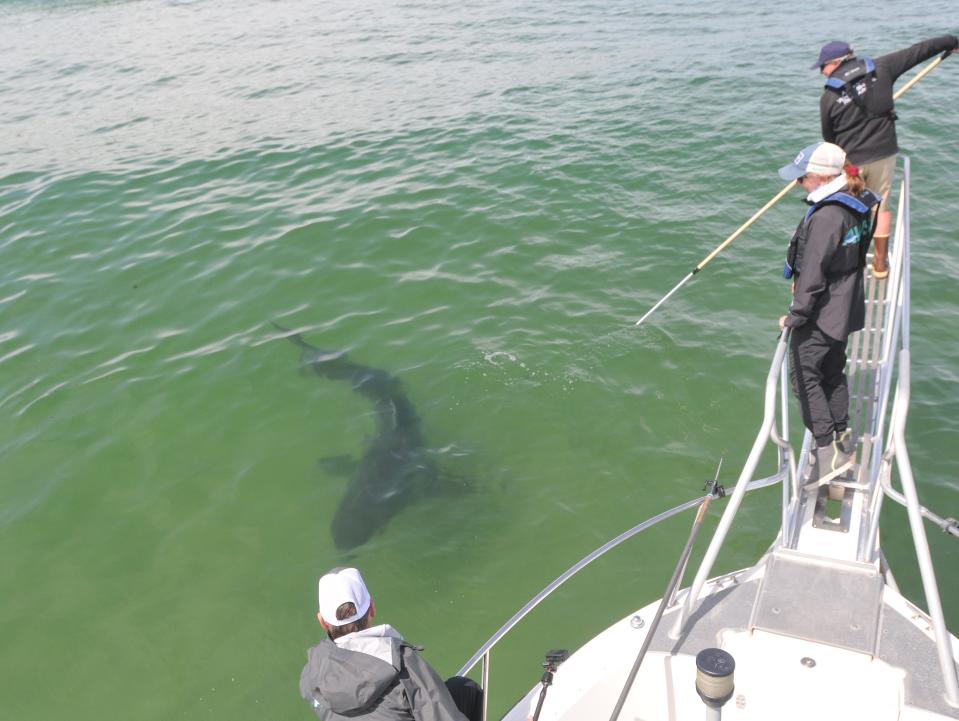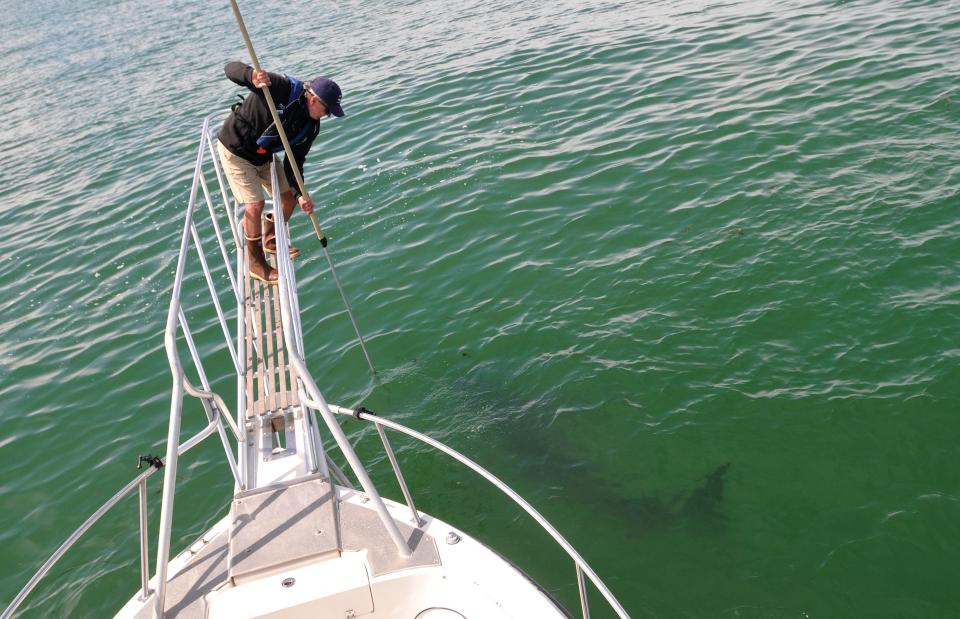Underwater video, National Geographic chats: What Cape Cod's shark experts do in winter
SAGAMORE — At the entrance to the boardwalk at Scusset Beach State Reservation in Sagamore, a sign warning about the presence of Atlantic white sharks shivered against a bulletin board in a stiff, icy wind.
Do not swim alone, it silently proclaimed.
Do not swim at dawn or dusk, when sharks may be active, it advised.
Be vigilant, it insisted.
Out on the beach, nobody was there to pay heed, only wild winter solstice waves combing over an abandoned beach. The waves spit out sprays of half frozen sea foam, and a few dried-out bits of wind-driven wrack and mermaid purses skated across the sand among footprints left by absent shore birds and crabs.
The sharks may be out of most people's minds as they settle in for winter, but not so for researchers Meg Winton, senior scientist at the North Chatham-based Atlantic White Shark Conservancy and Gregory Skomal, a noted shark expert with the Massachusetts Division of Marine Fisheries.

Instead, they are spending their "off season" talking about the Cape's prolific white shark population and what they're learning about it with National Geographic filmmakers, mulling over their 2023 research season —unrelenting in their drive to understand what makes the apex predators tick.
"Next season we’ll be continuing data collection for the same projects we were this year," said Winton by email on Thursday. "I know that’s not very exciting, but these types of studies often require multi-year, long term datasets."
During the warmer months, Skomal and Winton, along with other researchers and volunteers with the Conservancy, spend all the time they can on the waters off the Outer Cape, searching with the help of a spotter pilot in the air, tagging newcomers and recording returning individuals. Always they are collecting more data about the sharks' behavior: where and when they hunt, how close they come to shore, when they arrive, when they leave, what strategies they use.
Ultimately, the goal is not only to improve public safety in a place where more sharks are congregating to hunt in the same waters people flock to for recreation in the summer — an important element of the Cape's tourist-driven economy — but also to educate and inspire white shark conservation.
During the 2023 season, the researchers went on 22 outings between July and late October, and Skomal successfully tagged 34 new white shark visitors, three more than in 2022.
Winton said the highest number of sharks tagged in a single day this year was five.

The state's Division of Marine Fisheries and its collaborators began tagging white sharks in 2009. Since then, 304 individuals have been tagged. Advancements in tagging technology in recent seasons have brought new levels of sophistication to the data the researchers are collecting. The data allows them not only to track the sharks' regional movements, but also to see what they are doing at any given moment, at what depth, and under what conditions by way of video cameras included on some of the tags.
There is still much work to be done, and data to be analyzed. For this reason, Winton said, "there is no key takeaway as of yet."
"The tags deployed and the data collected this season are all part of multi-year projects. We just wrapped up the field season so haven't had time to generate any preliminary results yet," she said.
The researchers will spend coming months processing reams of underwater video footage collected over the summer, as well as data recorded by their acoustic array — a collection of underwater listening stations that detect and record the presence of tagged sharks.
For the second time this year, the researchers used drones to collect video footage of white sharks. They want to employ more of this technology next season.
According to the Conservancy, the drone footage is useful for investigating "potential relationships between environmental conditions and predatory behavior and to evaluate the potential efficacy of a frequently proposed shark surveillance measure."
In recent years, Cape Cod has become a world hotspot for white sharks, making it an ideal place to conduct in-depth studies of the otherwise elusive predators. The work being done by the Conservancy and the state Fisheries is advancing white shark research around the world.
In November, members of the Conservancy research team attended the White Sharks Global conference in Port Lincoln, Australia. While there, Winton had the honor of presenting her first-of-its-kind population estimate that was published this summer in the Marine Ecology Progress Series journal.
The study estimated that 800 individual white sharks visited the near-shore waters of Cape Cod, mostly favoring the Outer Cape, over the four-year course of the survey, from 2015 to 2018.
“The conference provided a valuable opportunity to share information with the international white shark science community about ongoing research and education programs, and learn from scientists working at other white shark hotspots around the world,” said Winton.
The last white shark-focused conference, she noted, was held in 2010, "just as Cape Cod was emerging as a new hotspot.”
Heather McCarron writes about climate change, environment, energy, science and the natural world, in addition to news and features in Barnstable and Brewster. Reach her at hmccarron@capecodonline.com, or follow her on X @HMcCarron_CCT
Thanks to our subscribers, who help make this coverage possible. If you are not a subscriber, please consider supporting quality local journalism with a Cape Cod Times subscription. Here are our subscription plans.
This article originally appeared on Cape Cod Times: What do Cape Cod's shark researchers do in the 'off-season'?

